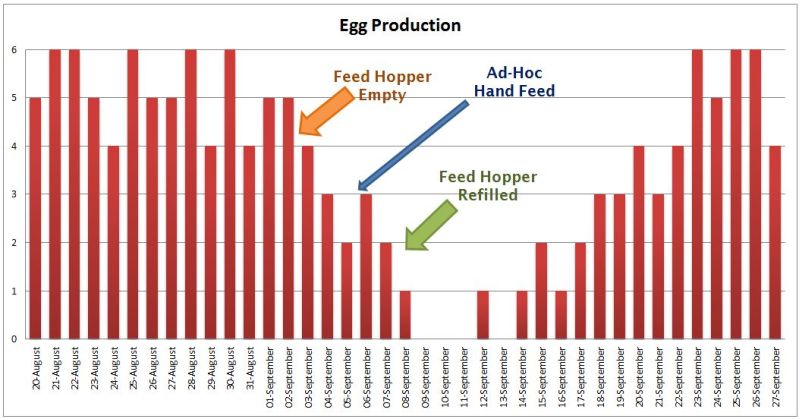I can’t believe it’s been so long since I updated this blog.
Quite a few things have happened recently including, traveling to East TImor, Contracting Dengue Fever! (a story for another time) and going on a road trip for a mate’s wedding and to visit family in Queensland (also the subject of a future blog) which, strangely, leads us neatly into the subject of today’s little missive.
While we were away in Queensland, the task of looking after the chickens, along with all the other household tasks, fell to the younger members of the household. By and large, our twenty somethings did a sterling job and the house was still standing and in one piece on our return two weeks later.
However, when I asked about the chickens, they told me that the chickens were OK but they hadn’t been getting many eggs in the last few days. At first I thought the chooks had found another place to lay but when I asked about refilling the feed hopper as I had instructed before we left, they looked at me blankly (the youngens not the chooks). One of the them replied, “Oh, sorry, I didn’t know! But I did give them a bowl of food the day before yesterday ’cause they seemed to be hungry!”
When I pointed out that, unlike the cat who took days to get through a bowl of dry food, the chickens would eat bowl of feed in less than a day and were probably starving, they were ashen faced. Sure enough, when I went to check on the chickens, they were out of food and they fell over themselves racing up to the hopper as I refilled it.
I checked them over and they seemed to be in pretty good condition which is understandable since they are have a relatively large area to roam and had been able to get a reasonable amount of food to keep them going. However, the first thing chickens do when they get very hungry is to shut down egg production and this was the reason for the lack of eggs. I figured that the hopper was probably empty for about 6 days before we got home!
Even after the chooks had a good supply of food it took quite a while for them to come into production again and it was probably two weeks before they were back to normal.
This highlights three things
- If you are going to keep animals of any kind, whether it be chooks or goldfish, cat and dogs or even bees, then it your responsibility to make sure they are looked after and cared for. It doesn’t matter why you are keeping the animals. They could be pets or companions, producers or food, or any other reason. Once you have them, you have accepted responsibility for their well being.
- Quite apart from the ethical and moral considerations, if you don’t look after the animals that are producing eggs, honey, milk, wool,etc. than their productivity drops and you lose that benefit.
- If you are going to entrust others to look after animals on your behalf then it is critical that you make sure that they have been given proper training or instructions and have demonstrated that they understand how to care for the animals.
We were probably a bit lucky that no real damage was done and our chooks did not suffer any ill effects in this case, but it goes to show that you can’t afford to be complacent.
Ah well, as Shakespeare said…
“All’s well that ends well”
